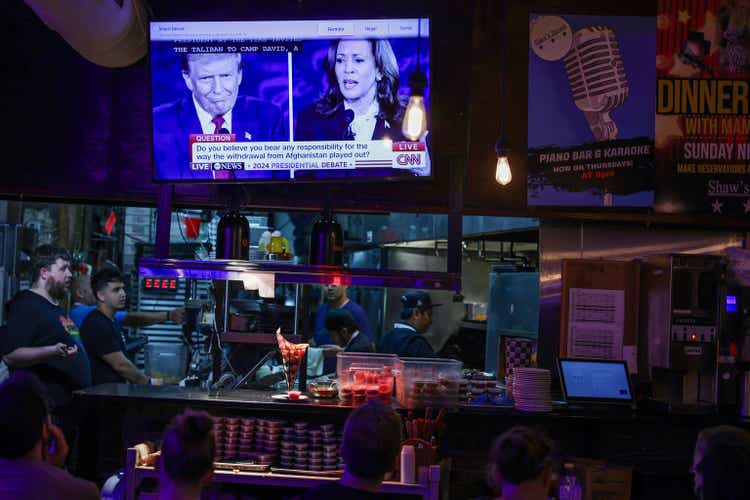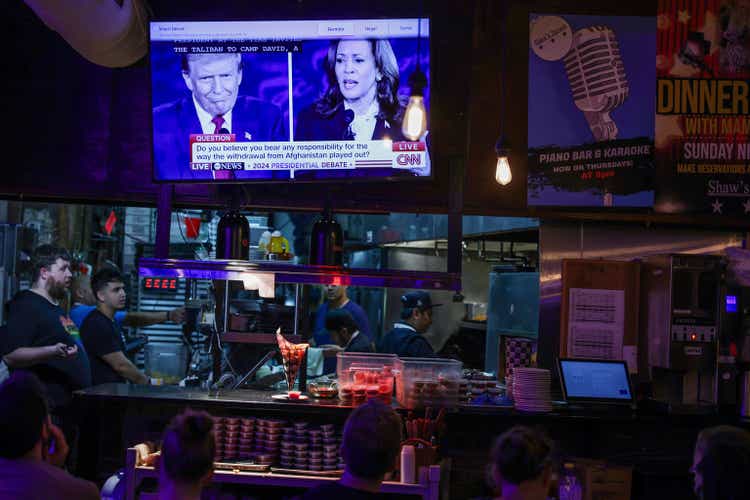
Alex Wong
Regardless of which party wins the White House and Congress, banks are poised for a multi-year inflection for earnings, Wells Fargo analyst Mike Mayo said in a note to clients.
“Some items transcend the election,” he said. Overall, he expects earnings to improve, banks to increasingly deploy excess capital, and a further lightening of Basel III endgame proposals. Mayo also sees an opportunity for either party to reassess Dodd-Frank, imposed in reaction to the 2008 financial crisis, with an eye on improving efficiency.
Mayo and colleagues put forth four scenarios for how the elections will shake out, and their implications for the banking sector.
Trump wins, Republicans control both chambers of Congress: positive. The most obvious outcome would be lighter regulations, specifically bringing Basel III endgame rules closer to current capital requirements. Reduced regulatory paperwork could lower banks’ regulatory costs by 5%, adding 25-50 basis points to the efficiency ratio. He also expects higher rates and GDP growth, which could produce mixed results as higher rates would initially hurt accumulated other comprehensive income and capital, but help credit quality and NII longer term.
Harris wins; Democrats control Congress: negative. Basel III endgame would settle on capital requirements that are 10%-20% higher than current levels. There would be little or no reduction to regulatory costs. He expects a blue sweep would be neutral for GDP and would result in inflation equal to or less than a red sweep. Credit quality would be mostly unchanged. He sees a less steep yield curve than a red sweep. “Higher capital requirements and regulatory costs would outweigh potential yield curve/GDP benefits,” Mayo wrote. It would also increase the risk of a corporate tax rate increase, a negative for banks.
Trump/divided government: positive. “In short, we believe a Trump/divided government would look a lot like the current economic situation with less regulation — a net positive,” Mayo said.
Harris/divided government: neutral to slight positive. That outcome would likely mean higher capital requirements, some reduction in regulatory costs, less government spending, and lower inflation/rates/GDP. “A split government is typically good for stock markets and GDP growth,” he said.
Relevant tickers: JPMorgan Chase (NYSE:JPM), Citigroup (NYSE:C), Bank of America (NYSE:BAC), Wells Fargo (NYSE:WFC), Morgan Stanley (NYSE:MS), Goldman Sachs (NYSE:GS), U.S. Bancorp (NYSE:USB), PNC Financial (NYSE:PNC), Truist Financial (NYSE:TFC).
The KBW Nasdaq Bank Index fell 0.2% and the KBW Nasdaq Regional Banking Index dropped 0.7% in Tuesday afternoon trading.
Dear readers: We recognize that politics often intersects with the financial news of the day, so we invite you to click here to join the separate political discussion.
Readers interested in investing topics tied to the upcoming election can find more information at the upcoming Seeking Alpha Investing Forum: Election 2024; please visit the event website.
